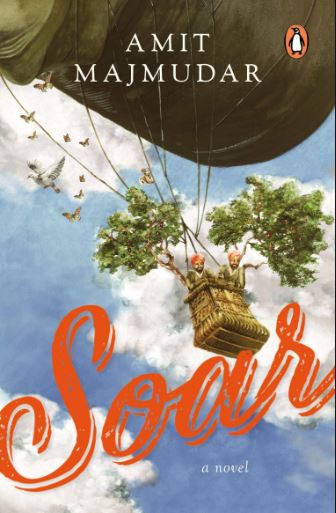The novel is full of witticisms and entertaining episodes — in the course of their journey, Khudabaksh and Bholanath are shot at, chased by dogs, and trip on wild mushrooms. But perhaps what is most interesting is the boldness with which Majmudar — the author has previously translated the Gita and retold the Ramayana from unconventional perspectives — addresses the role of religion in violence. How does Khudabaksh interpret the Prophet’s command to punish non-believers, or Bholanath answer when asked about Krishna’s exhortation to Arjuna to fight the battle — “After all things are explained to him, and all things are shown to him, is Arjuna persuaded to shoot arrows into people’s chests?”
The brevity of the chapters, each of which reads like a fable at times, adds to the charm of the book. However, as the novel progresses, the plot, much like the hot-air balloon, takes the liberty of floating around mid-air, without a clear destination. In spite of the bizarre, enjoyable fragments that make up the book, the ending appears hastily drawn-up and keeps the reader hanging.

Soar: A Novel by Amit Majmudar, Viking, Rs 499 Amazon
Proximity often obscures vision. As such, reality can best be surveyed from a distance. Amit Majmudar provides such a vantage point to the reader in the novel, Soar, where two simpletons from an Indian village — Khudabaksh and Bholanath — drafted as soldiers in World War I, literally rise up and above a war-ravaged continent in a hot-air balloon to get a clear view of a world without borders. As they set off, unwittingly, on an absurd adventure across the seas, they find themselves in the company of an ill-tempered squirrel, who devours holy books like delicacy and takes on German fighter jets all by herself.
The two protagonists — best of friends in spite of their different faiths — present an impressive double act, quite in the tradition of great literary duos such as Rosencrantz-Guildenstern and Vladimir-Estragon. They, like Dostoevsky’s Prince Myshkin, are misfits in a corrupt world on account of their humanity and lack of guile: while working as stretcher-bearers, they end up rescuing wounded soldiers from the enemy camp, give refuge to anything they find stranded, and speak to pigeons — incidentally, the birds of peace. Although the tone of the book is light and humorous, the exchanges between Khudabaksh and Bholanath are rather heavy. These often begin with basic observations from their balloon and end up in profound contemplations on matters such as human nature, religion, war. Some of their pronouncements about the future are prophetic — they foresee Partition and America’s moon-landing — while some others, readers of this generation well know, are tragically off the mark — they conclude that people would not want another war after witnessing the devastation caused by World War I. The simplicity of the duo is often comical — their elaborate, although misinformed, conversations evoke laughter as much as their ignorant prejudices about races and cultures do. But therein lies the tragedy as well. No matter where they arrive, Khudabaksh and Bholanath encounter soldiers who, like them, must have been uprooted from their simple lives to fight a war they had little connection with. Perhaps they, too, dream of their homes, kites in the sky, and puppet shows.










